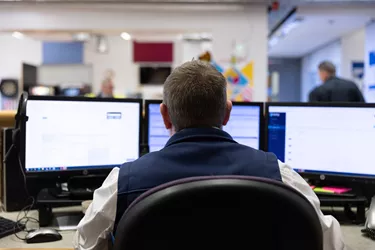Why voting matters to me
Katie from our Policy & Campaigns team believes that, despite the cynicism that surrounds politics, voting can make a difference.
You’ve heard that there’s an election coming up, right? And you’re being told from all media angles that this election, and your vote, ‘matters’. I’ve been thinking about whether this is true and whether things can actually change.
Firstly, does my vote matter? Well, in short, yes. It does. Up and down the country there are MPs who were elected by only a few votes more than their rivals. In 2010, Glenda Jackson won her seat in Hampstead and Kilburn by just 42 votes. Dan Byles won North Warwickshire by 54 votes. George Eustice won Camborne and Redruth by 66. And in the Fermanagh & South Tyrone seat in Northern Ireland, the MP won by just 4 votes. 4! So realistically, my vote can make a difference.
But maybe, like me, you’re concerned that most people in politics don’t really sound or look like you, or the people close to you. It’s hard to ignore that - currently only 148 MPs, out of a total 650, are women and only 27 are from BME backgrounds (this would be 117 if it represented the UK population). There are disproportionally too few MPs with disabilities and too many who were privately educated. Given this I understand why lots of people feel disenchanted by politics generally.
And then there’s the question of whether the people we elect actually care about the same things we do. I guess politics is pretty basic when you think about it: people who want to be elected as MPs need our vote, so they have to be seen to take notice of what issues voters like us care about. This may sound a bit cynical, and I’m far too young to be an old cynic, but that’s the crux of it. This presents an opportunity. If you show politicians that something – let’s say mental health, as we’re here – is important to you, then they too will have to get their heads around it, take a view on it and speak out about it. In fact, we’ve seen this in the progress made on mental health in the last few years. Since MPs first spoke out about their own experiences in 2012, the profile of mental health in politics has grown, putting pressure on the Government to make important decisions on things like funding for mental health, and standards of care.
It’s not quite that simple though. Politicians are more likely to care about the things that matter to people who vote. And the problem is that there are some groups who are consistently less likely to. In the 2010 election just 44 per cent of 18-24 year olds voted, compared to 76 per cent of over 65s. This means that older people have much more influence over politics – and the views of younger people, like me, are less visible in the policies that come out.
The same goes for other groups that have a lower rate of turnout; people who are inpatients at psychiatric hospitals (a study of the 2010 General Election found that psychiatric in-patients who were eligible to vote were half as likely to register as the general population), people with disabilities, people without fixed addresses and people who are socially isolated.
If, like me, you are thinking ‘Ah, this is not right! I want politicians to hear about what I care about too’, then there are things you can do to make your voice heard:
- Register to vote
- Find out who your candidates are and what they stand for
- Decide which candidate and party you want to vote for
- Get out on 7 May, use your democratic right and vote


Our campaigns
We'll fight your corner. We believe everyone with a mental health problem should be able to access excellent care and services. We also believe you should be treated fairly, positively and with respect.
Share your story with others
Blogs and stories can show that people with mental health problems are cared about, understood and listened to. We can use it to challenge the status quo and change attitudes.

















